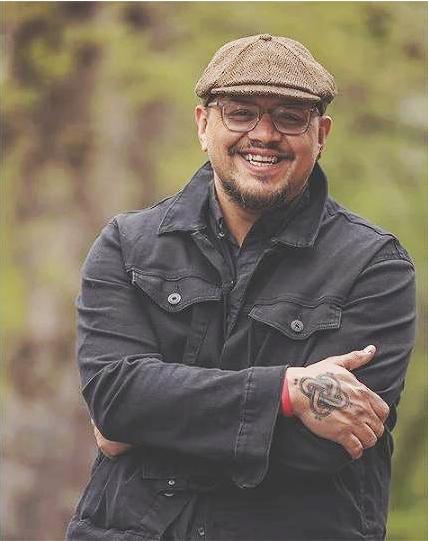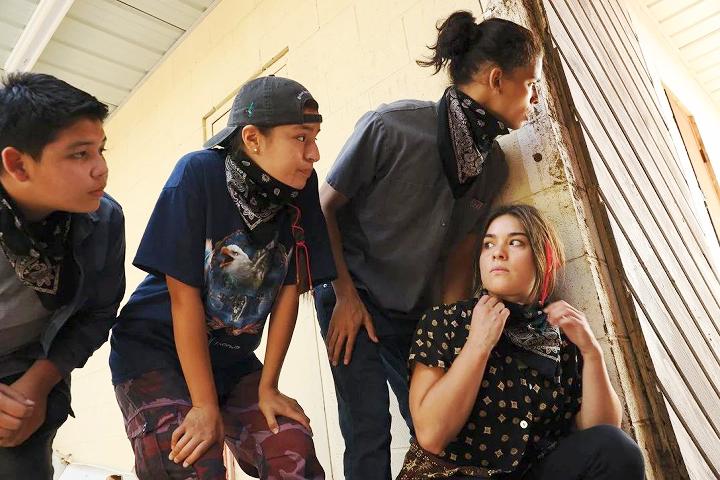 |
Canku Ota
|
 |
|
(Many Paths)
|
||
|
An Online Newsletter
Celebrating Native America
|
||
|
September 2021 - Volume
19 Number 9
|
||
|
|
||
|
'Reservation Dogs'
Marks A Breakthrough For Indigenous Representation Onscreen
|
||
|
by Jason Asenap, High
Country News
|
||
|
"Thor: Ragnarok"
director Taika Waititi and Sterlin Harjo developed a comedy about
Native American teens in Oklahoma that stars four young Native actors
Seminole/Muscogee Creek filmmaker—and now showrunner—Sterlin Harjo called me from the cab of his pickup truck while he was out running errands around Tulsa, Oklahoma. It's a town he loves in a state he loves, the place where he has made most of his films. And the feeling is reciprocated; he now has a spot on the Oklahoma Walk of Fame, just in front of the city's local art-house theater, Circle Cinema. Not too long ago I would have been able to just shoot him a text and schedule a quick interview. (Full disclosure: Harjo and I are friends.) But now, given his busy schedule, I had to go through his assistant to schedule a meeting. Because of a time mix-up on my end—he was in Oklahoma; I was in New Mexico—Harjo Zoomed me from his phone. While he drove, we talked about his exciting new coming-of-age project for FX Networks: "Reservation Dogs." He was in no hurry to get home: "I got a plumber in my house, so it's perfect timing." He was busy editing the last episodes for "Reservation Dogs," which recently premiered at the Tribeca Film Festival. Harjo directed three episodes, Navajo filmmakers Sydney Freeland and Blackhorse Lowe each directed two episodes, while Tazbah Chavez, who is a citizen of the Bishop Paiute Tribe, directed one. In fact, all the directors and writers are Indigenous, and Indigenous people are involved at every level of production. It's a genuine, one-of-a-kind breakthrough. The idea for the show came about when Harjo and his good friend, the multi-talented Maori creative force Taika Waititi, realized they both had interesting scripts that shared the same themes. Waititi pitched an idea for a series to FX. Harjo expected to hear back in about a year, assuming he was lucky, but his agents contacted him just three days later with an offer.
"Reservation Dogs" is a comedy about four Indigenous teenagers in Oklahoma and the small town/reservation mischief they get into. It's based on the kind of stories that Harjo and Waititi often shared. "We always told each other stories from home and laugh, and it's always funny stories and never depressing shit. We wanted to reflect that and make a show that was a comedy. There's real issues that they deal with, but they handle it through humor." The four lead actors, who range in age from 14 to 17, are all Native American: D'Pharaoh Woon-A-Tai (Ojibwe), Devery Jacobs (Kanien'kehá:ka Mohawk), Paulina Alexis (Alexis Nakota Sioux Nation), and Lane Factor (Caddo and Seminole Creek). Selling the project proved easier than expected, and Waititi was scheduled to shoot the pilot, but then Covid-19 hit, and everyone had to be sent home. "Of course, a Native show happens, and a worldwide pandemic shut us down," Harjo said wryly. But FX was committed, and after a break, production resumed. Because of the pause and the change in schedule, however, Waititi was no longer available to direct, so Harjo stepped in and took over the pilot. When it was time to bring in other directors, he looked no further than established filmmakers he already had confidence in. Just as Waititi had opened doors for Harjo, Harjo wanted to do the same for his fellow Native filmmakers. "Sydney is almost a freaking veteran of TV directing now, so I wanted her to be there to help set the tone. I wanted Blackhorse and Tazbah to shadow and see Sydney directing the first episodes. But really it was just opening the door for them. And trying to get them into TV directing. It's a hard racket to get into." Blackhorse Lowe is a Tulsa Artist Fellow. His first feature film, 5th World, premiered at Sundance in 2005, but "Reservation Dogs" is his first foray into directing for TV. I spoke to him after he wrapped up shooting in Tulsa and was getting ready to head to New Mexico to location scout for his next feature film. Lowe summed up his experience in a rush of long, excited sentences that hinted at his larger feelings. "There are no words for me right now, but really positive and excited and just looking forward to the show coming out and people seeing it and receiving it in a positive way and seeing something that hasn't been seen before." He recognizes how special the moment is. The two episodes he directed feature two well-known Indigenous actors, Gary Farmer and Wes Studi, and comedian Bill Burr, of whom Lowe is a fan, makes an appearance later in the season. "There's a whole lot of cool people in the show." Directing for TV is quicker than directing for film; Lowe's episodes of the 30-minute show had to be completed in four days. "Nine pages a day," Lowe said, adding that "with Covid restrictions, you're only allowed 10 hours on set." The schedule was fast-paced, but Lowe had a larger budget than he's used to working with. Indie films, in comparison, are often a scramble: "We were always limited by funds, time, availability of people," Lowe said, "whereas with TV, you're given all the toys to play with, and the professionals. So there really was nothing in my way other than myself; the sky was the limit." Lowe generally likes to keep things close to the vest, but his enthusiasm bubbled over when he spoke about the show. "It was all magic," he told me. "Productions like this don't come together this magically, but in this case it did, and everyone was just awesome which is very unique. You don't get that on most film sets—there's always something going on—but everyone was just awesome." "Reservation Dogs" and the new Peacock TV series "Rutherford Falls" mark a new era of Indigenous representation, in which Native people are in the writers' room telling the story as well as behind the camera, directing the action. Both series are comedies, but "Reservation Dogs" is the more obviously cinematic of the two. "I think it's important to have both shows," Harjo said. "It's cool they have that different sort of vibe."
There's a fair amount of cross-pollination between the two shows. Devery Jacobs appears in both, while Migizi Pensoneau (Ponca/Ojibwe) has a role in "Rutherford Falls" and also writes for "Reservation Dogs." Writer Tazbah Chavez works on both shows, as does Bobby Wilson (Sisseton-Wahpeton Dakota), who both acts and writes. "It was crazy that FX let us do that," Harjo reflected in his truck as he headed home for his appointment with the plumber. "It was just kind of a dream come true." And it's not over yet, not by a long shot. This is just the beginning of a new era of Native representation, Harjo believes. "It's an exciting time right now," he said. "There's all these shows coming out. There's going to be a lot of shows, and all of them are different. That's what's cool, and I think that's what's going to solidify our place in TV. Hollywood and the public is going to see there's no end to the stories that we have." Jason Asenap is a Comanche and Muscogee Creek writer and director (and an occasional actor) based in Albuquerque, New Mexico. This story was originally published in the August issue of High Country News (hcn.org). |
||||||
|
|
|
|
||
|
|
||
| Canku Ota is a free Newsletter celebrating Native America, its traditions and accomplishments . We do not provide subscriber or visitor names to anyone. Some articles presented in Canku Ota may contain copyright material. We have received appropriate permissions for republishing any articles. Material appearing here is distributed without profit or monetary gain to those who have expressed an interest. This is in accordance with Title 17 U.S.C. Section 107. | ||
|
Canku Ota is a copyright ©
2000 - 2021 of Vicki Williams Barry and Paul Barry.
|
||
 |
 |
|
|
The "Canku
Ota - A Newsletter Celebrating Native America" web site and
its design is the
|
||
|
Copyright ©
1999 - 2021 of Paul C. Barry.
|
||
|
All Rights Reserved.
|
||


